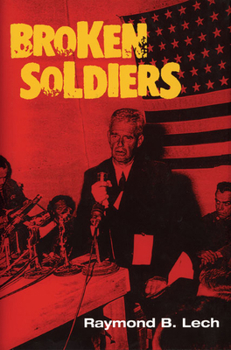Broken Soldiers
Select Format
Select Condition 
Book Overview
Traversing the no-man's-land of political loyalty and betrayal, Broken Soldiers documents the fierce battle for the minds and hearts of American prisoners during the Korean War. In scorching detail, Raymond Lech describes the soldiers' day-to-day experiences in prisoner-of-war camps and the shocking treatment some of them received at the hands of their own countrymen after the war. Why, he asks, were only fourteen American soldiers tried as collaborators when thousands of others who admitted to some of the same offenses were not? Drawing on some 60,000 pages of court-martial transcripts Lech secured through the Freedom of Information Act, Broken Soldiers documents the appalling treatment and the sophisticated propagandizing to which American POWs fell victim during the Korean conflict. Three thousand American soldiers perished in North Korean camps over the winter of 1950-51, most from starvation. Through the unsentimental testimony of survivors, Lech describes how these young men, filthy and lice-infested, lost an average of 40 percent of their body weight. Many also lost their powers of resistance and their grip on soldierly conduct. After six months of starvation, the emaciated, disoriented prisoners were subjected to a relentless campaign to educate them to the virtues of communism. Bombarded with propaganda, the Americans were organized into study groups and forced to discuss and write about communism and Marxism, even to broadcast harangues against capitalist aggression and appeals for an end to the war. Lech traces the spiral of debilitation and compromise, showing how parroting certain phrases came to seem a small price to pay for physical safety. Threatened with starvation and indefinite confinement in Korea, many POWs succumbed to pressure to mouth communist slogans and provide information far in excess of the regulation "name, rank, and service number." Of the thousands of American soldiers who, while prisoners in North Korea, spoke and wrote favorably of communism and disparaged their country, a handful were charged with collaborating with the enemy. Why were so few singled out? Why did each branch of the armed services judge parallel circumstances differently, and why were American soldiers not realistically prepared for capture? A powerful indictment of justice miscarried, Broken Soldiers raises troubling questions that remain unanswered decades after the events.
Format:Hardcover
Language:English
ISBN:0252025415
ISBN13:9780252025419
Release Date:August 2000
Publisher:University of Illinois Press
Length:360 Pages
Weight:1.54 lbs.
Dimensions:1.1" x 6.3" x 9.3"
Customer Reviews
1 rating
Crossing the Line
Published by Thriftbooks.com User , 19 years ago
This is a great book. It's another one of those "what would I have done if I was there?" Frankly, I don't know. It's easy to ponder what I would have done or what the right thing to do under those circumstances was from a warm office, 52 years after the fact. The author packed in a lot of historical information about the Korean War, the POW experience, and the courts-martial, but also kept the characters alive and the book read like a great but tragic novel. Some of the characters in the book, such as PFC Rothwell Floyd or SGT Gallagher were despicable and richly deserved their convictions and sentences. The rest, like COL Liles, LTC Fleming, and Major Alley seemed to be only doing what they needed to in order to survive and save their men. At some point though, it seems like some of the POWs began crossing the line and doing more than what they needed to survive. This book confirmed the absolute evil of communism and its double-speak with words such as "justice", "peace", etc. that were used to mask its real agenda. It was also ironic how many of the Chinese and North Korean interrogators were highly educated people who had studied English at American universities. This book really shows the depravity that men can sink to under some circumstances.





